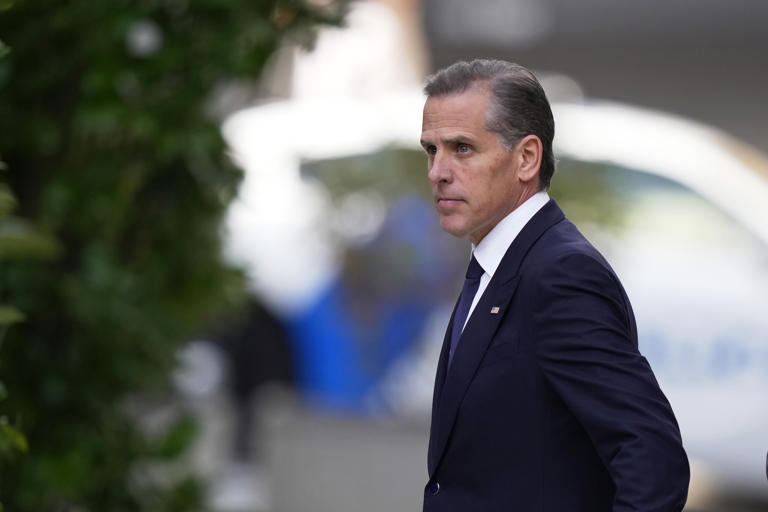Hunter Biden, federal firearms case, jury selection, opening statements, President Joe Biden, gun charges, Delaware trial, Hunter Biden trial, 2024 election, Hunter Biden indictment
A jury has been selected in Hunter Biden’s federal firearms case, and opening statements are set to begin. This article delves into the charges, jury selection process, and the political and legal implications of the trial. Learn more about how this high-profile case could impact the 2024 election and the Biden family.
On Monday, a jury was seated in the federal firearms case against Hunter Biden, son of President Joe Biden. The selection process involved thorough questioning of prospective panelists regarding their views on gun rights and drug addiction. This took place under the watchful eye of the First Lady, who attended the proceedings from the front row of the courtroom.

Case Background and Charges
Hunter Biden faces three felony charges in Delaware related to a 2018 firearm purchase during a period he described in his memoir as being deeply addicted to crack cocaine. He is accused of lying to a federally licensed gun dealer by falsely claiming on his application that he was not a drug user and of possessing the gun illegally for 11 days. These charges stem from an investigation into his business dealings, which initially aimed to resolve through a plea deal. However, that deal fell apart, leading to the current trial. Hunter Biden has pleaded not guilty, asserting that he is being unfairly targeted by the Justice Department, particularly in the wake of Republican criticism of the previous plea arrangement as preferential treatment for the President’s son.
Jury Selection Process
The jury selection process proceeded swiftly, with a pool of about 65 individuals narrowed down to 12 jurors—six men and six women—along with four female alternates. Judge Maryellen Noreika conducted the process, questioning potential jurors individually to assess their impartiality. They were instructed not to discuss or read about the case outside the courtroom.
Prospective jurors faced questions about their knowledge of the case, their views on gun ownership, and whether they or someone close to them had experienced substance abuse or addiction. Politics also played a role in the questioning, with some potential jurors being excused for expressing doubts about their ability to remain unbiased.
For instance, one woman was excused after admitting her negative opinion of Hunter Biden based on media reports. Another man was dismissed for believing that politics influenced the charges. The selected jurors included a woman whose sister had a criminal record involving drugs and credit card fraud, a man whose father was killed in a gun-related crime and whose brother served time for drug possession, and a woman whose husband is a gun owner and former law enforcement officer.
Context of the Trial
This trial is taking place amidst significant political and legal turmoil. Just days before, former President Donald Trump, the presumed 2024 Republican presidential nominee, was convicted of 34 felonies in New York City related to a scheme to cover up a hush money payment. Although the two cases are unrelated, their proximity highlights the judiciary’s prominent role in the 2024 election campaign.
Implications and Concerns
Hunter Biden’s trial is expected to delve into some of the most troubling aspects of his past, potentially impacting his father, President Joe Biden. The President has long been concerned about his son’s struggles with sobriety and the public scrutiny that this trial will bring. While the case does not involve Hunter Biden’s foreign business dealings—an issue often highlighted by Republicans without substantial evidence to accuse the Biden family of corruption—it will undoubtedly put his personal battles and mistakes in the spotlight.
The trial also casts a shadow over Hunter Biden’s upcoming legal challenges. He faces another trial in California in September for failing to pay $1.4 million in taxes. Both cases were initially supposed to be resolved through a plea deal last July, concluding a lengthy investigation into his business dealings. However, Judge Noreika, a Trump appointee, raised concerns about the unusual aspects of the deal, including a proposed guilty plea for misdemeanor tax offenses and a diversion agreement for the gun charge. This agreement would have dismissed the gun case if Biden stayed out of trouble for two years. When negotiations between lawyers fell through, Attorney General Merrick Garland appointed David Weiss, the former U.S. attorney for Delaware, as a special counsel. This led to Hunter Biden’s indictment a month later.
Political and Legal Ramifications
The Hunter Biden case is unfolding in a highly charged political environment, with significant implications for both the Biden family and the broader political landscape. The trial’s timing, so close to the 2024 election, adds a layer of complexity and potential impact on the President’s re-election campaign. It also raises questions about the role of the judiciary in high-profile political cases and the extent to which personal issues of public figures should influence legal proceedings.
As the trial progresses, it will continue to attract widespread attention and scrutiny, not only for its legal ramifications but also for its potential to sway public opinion and political dynamics in the lead-up to the 2024 presidential election. The outcome of this case, along with Hunter Biden’s tax trial in California, will likely have lasting implications for the Biden family and their political fortunes.
Read More-